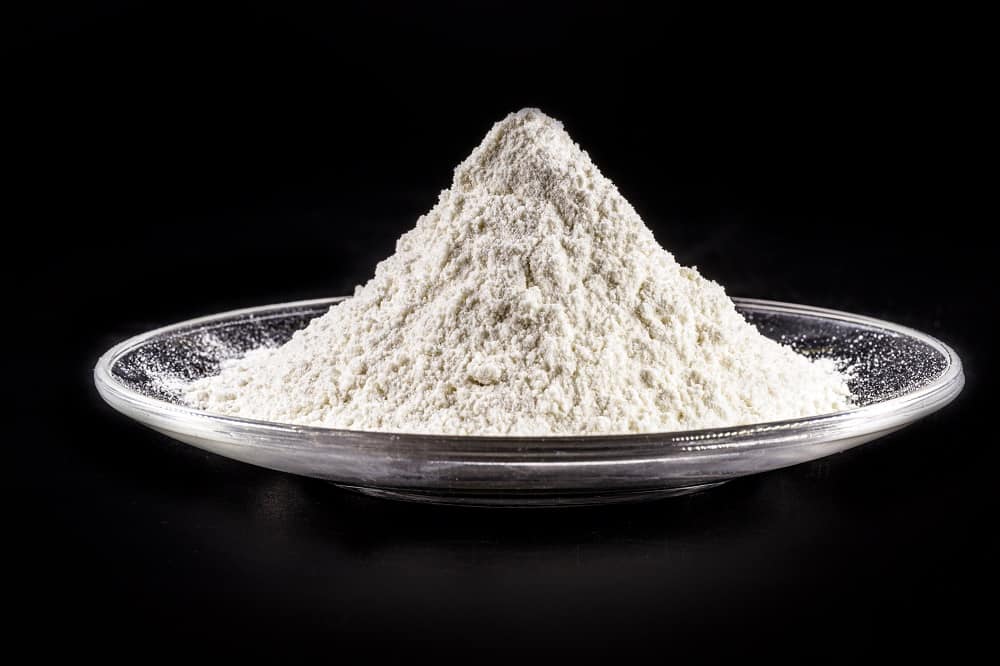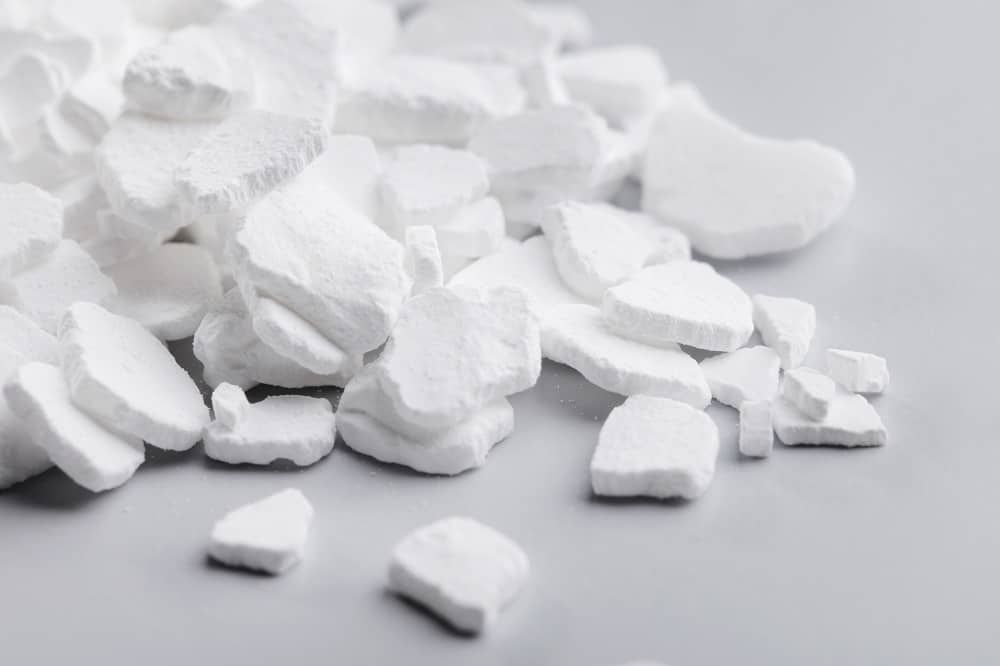Calcium chloride is a food additive that individuals are able to see in the ingredients list of many different food products. From canned vegetables to sports drinks, calcium chloride serves different roles due to its versatility as a food additive. Generally regarded as safe to consume, many people may not be familiar with this mineral and might wonder whether calcium chloride is vegan or not.
Calcium chloride is a vegan food additive as its production does not involve any animal product or derivative. Primarily, the mineral can be produced as the byproduct of the industrial process in making sodium carbonate. It can also be produced by reacting calcium carbonate with hydrochloric acid. The additive is used in the food industry in a number of ways like as a flavor additive, brining material, electrolyte, firming agent, brewing salts, and many more.
Table of Contents
Calcium Chloride

Calcium chloride is an inorganic salt that is denoted by the chemical formula CaCl2 (1). It is a white crystalline solid but is most commonly encountered in its hydrated form. In ingredients lists, the mineral is typically listed as calcium chloride, but it can also be listed by its E number: E509.
Calcium chloride is a very versatile food additive because it can play many different roles in the food industry. Due to its significance in the food industry, and many other industries, calcium chloride production is on the rise. The calcium chloride market reached a value of USD 1.06 billion in 2020 and is expected to reach USD 1.50 billion by 2026 at a 5.78% growth (2).
One common use of calcium chloride is as a firming agent – a substance used to precipitate residual pectin to strengthen the structural integrity of the food. Hence, calcium chloride is often used for this purpose in canned vegetables.
As a salt, calcium chloride is also used as an electrolyte. Many different sports drinks (like Gatorade) and beverages add calcium chloride to improve their mineral profile.
Calcium chloride is also an excellent brining material. The mineral effectively adds the salty flavor without adding sodium. Many food products also use calcium chloride as a food additive to add this salty flavor.
Bottled water manufacturers also add calcium chloride to their bottled water. Along with other minerals such as potassium bicarbonate, magnesium chloride, and other salts and minerals, calcium chloride affects the taste of the water. These salts and minerals are also used to fortify water and help provide the body with these necessary micronutrients.
Beer production also relies heavily on calcium chloride as it can affect the resulting type and quality of the beer. Other brewing salts used would include calcium carbonate, calcium sulfate, magnesium sulfate, and sodium bicarbonate.
Calcium chloride, along with other salts, is often used as a freezing depressant. Increasing the amount of solutes in a product makes it more difficult for a product to freeze entirely. Additives such as calcium chloride are the reason ice cream can be enjoyed as a frozen treat and not as a plain block of ice.
Calcium chloride is also used for calcium fortification. Products such as milk and other dairy products that are supplemented with additional calcium use calcium chloride along with other calcium salts such as calcium hydroxide, calcium silicate, calcium carbonate, calcium sulfate, calcium acetate, calcium malate, and many more (3).
Is Calcium Chloride Vegan?

By all means, calcium chloride is a vegan ingredient that can be found in many food items and beverages. Calcium chloride is a naturally occurring mineral that can be found in large amounts in salt lakes and salt deposits.
The production of calcium chloride relies on chemical processes and mineral raw materials. No animals or animal derivative is involved or used in the synthesis of calcium chloride. Thus, calcium chloride is suitable for people with vegan diets and lifestyles.
Calcium Chloride Synthesis
There are two major ways calcium chloride is produced.
The first way is through the reaction of calcium carbonate and hydrochloric acid. Specifically, the reaction takes one mole of calcium carbonate and two moles of hydrochloric acid to produce one mole of water, one mole of carbon dioxide, and one mole of calcium chloride.
A significant amount of calcium chloride is also produced from limestone – specifically as a byproduct of the Solvay process. The Solvay process, also known as the ammonia-soda process, it is the process for producing soda ash (sodium carbonate). The Solvay process reacts sodium carbonate and calcium carbonate to produce sodium carbonate. However, the process also produces calcium chloride as well.
Food that Contains Calcium Chloride
Because of the versatility of calcium chloride, it is abundantly used in the food industry. The mineral can be found in sliced apples, coffee and tea, canned fruit, apple pie mix, canned milks, processed fruit, jams and jellies, milk powders, canned tomatoes and vegetables, baked goods, cheeses, and beverages.
Is Calcium Chloride Safe?
Calcium chloride is considered to be safe by numerous food safety authorities and evidence from sufficient data and studies.
The FDA lists calcium chloride, or anhydrous calcium chloride, to have passed the specifications of the Food Chemicals Codex. Allowing calcium chloride to be used in a number of different ways, the FDA categorizes the food additive as “generally recognized as safe” and perfectly fit for human consumption (4).
EFSA also lists calcium chloride to be in accordance with its various standards and regulations in place. The evaluation of calcium chloride, and other common chlorides used in food, to be of low acute oral toxicity and poses no concern with respect to genotoxicity and carcinogenicity (5).
While consuming large amounts of anhydrous calcium chloride can cause several adverse health effects such as nausea, vomiting, and even burning in the mouth and throat (6), the general population should not be concerned with the trace amounts of calcium chloride typically added to food.
References
1. https://pubchem.ncbi.nlm.nih.gov/
2. https://www.businesswire.com/
3. https://nyaspubs.onlinelibrary.wiley.com/
4. https://www.accessdata.fda.gov/




